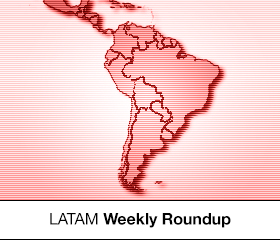DynAdmic Partners with Latin Interactive; Brazilian Mobile App Users Aren't Loyal to Brands
by on 30th Aug 2016 in News


This weekly Latin American Roundup covers the partnership between DynAdmic and Latin Interactive, a shortcut to the video ad tech to reach Colombia, Ecuador and Central America; brief insights of the mobile app market user behaviour in Brazil; and, finally, RTB's strategies to grow the Brazilian operations, just eight months after opening their local offices in the country.
DynAdmic joins Latin Interactive to reach Central America, Colombia & Ecuador
DynAdmic annouced earlier last week a deal with Latin Interactive (LIG) in order to expand their business to Central America, Colombia, and Ecuador. The deal's goal, according to the video ad tech company, is to reach those markets using Latin Interactive's support. It's worth mentioning that DynAdmic already have three offices dealing with Latin American campaigns: Brazil, Mexico, and Miami.
Headquartered in Miami, with a strong presence in Central America, Latin Interactive currently resells Microsoft, Yahoo, Shazam, RedMas, Audio Ad, Movistar Media, and Todoticket solutions. With the deal, DynAdmic offers are also part of the portfolio — focusing on contextual targeting for video ads.
“These new offers will allow us to effectively segment video and sync offline TV ads with online video ads”, said Gustavo Ortiz, CEO and co-founder, Latin Interactive. According to Valérie Behr, sales director, DynAdmic, the company was chosen not only for their presence in key markets for DynAdmic, but also due to their experience with big clients.
DynAdmic expects a revenue growth by 83% in Latin America, especially due to its expansion in Mexico and Colombia, where they aim to grow their local revenues by 128% and 97%, respectively.
Mobile app market: Brazilians aren’t loyal to brands in their mobile
A recent survey by the Brazilian Association of Online to Offline (ABO2O), partnered with the Spanish company Netquest, analysed data from 1.500 mobile apps users in order to better understand their behaviour. The results showed that Brazilians are not loyal to mobile apps brands, and are constantly looking for new offers and services.
The companies measured how people used their smartphones, apps, and the stores, looking at services in different sectors. The main outcome is that there aren’t consolidated brands in most areas in the app universe, such as beauty, healthcare, weddings, and pet services.
Excluding well-established niches, such as transport and food services, which have consolidated players, brands have even less importance when the app main focus is products (not services). In other words, consumers will purchase with any provider offering the lowest price. Even with such a low brand loyalty, the study estimates that mobile app companies in Brazil have an average growth by 30%.
RTB House focus on multiple retargeting in their first year in Brazil
In an interview with ExchangeWire Brazil, Rodrigo Lobato, country manager, RTB House Brazil, gave details of the local operations after the first months of local business — the company opened their local offices last January.
“While mostly competitors are offering standard solutions aiming a generic retargeting, we are taking another approach with technology to re-engage the local audience”, said Lobato. “For example, targeting consumers of a specific region, filtering by ‘the ones who bought a TV in the last three months and have already showed interested in products related to the TV’. We can even select, in this group, only the ones who have dropped a purchase”, said Lobato, emphasising the granularity level of their solutions in the country.
From their offices in Sao Paulo, RTB House operates business in Argentina, Chile, and Mexico. Also, Lobato says they are looking at expanding their teams in Latin America to those three countries in the future.
When questioned about being another retargeting provider in a saturated market, since it’s one of the entry points of ad tech for many companies in Latin America — which might have happened some time ago — Lobato cites Magna Global’s research. The study, which has been cited by many players to justify investments in the region, stated that programmatic had a 21% penetration in Latin America in 2015 and it is expected to grow to 40% until 2019. "Co-operation among retargeting providers is common, and even desirable. We believe that our clients shouldn’t limit themselves to a single provider. Our challenge is to help the market to understand the benefits of multiple retargeting”, he said.
“We encourage e-commerce players to work more with their providers to better use their ad budget. This strategy allows them to expand their reach, which can alter drastically how and when their campaigns are shown, but also stimulate competitors."
The full interview is published on ExchangeWire Brazil (in Portuguese).








Follow ExchangeWire